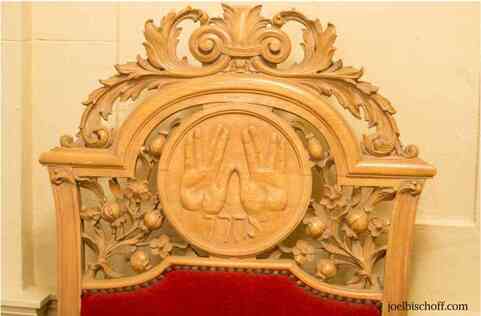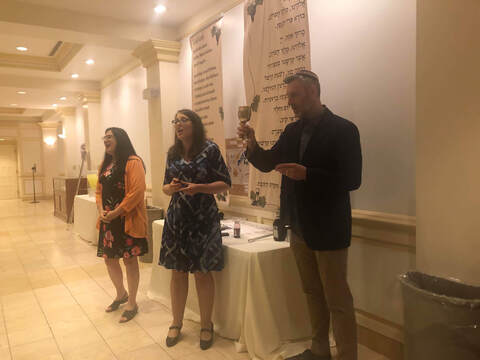
By Chava
I’d like to address what led me to convert to Judaism, what has been challenging and unexpected about it, and what good has come of the decision.
I became a Jew around this time of year, 33 years ago. My first child was born about 2 weeks later. I was one of three very pregnant women at a mikvah in Manhattan. I ended up at the mikvah, as exotic as the practice seemed to me when I first heard about it, because I wanted to do whatever was needed to assure there was no question as to the legitimacy of the conversion. I knew NO ONE who had been to mikvah at that point, and it was kind of funny to be regarded as a mikvah expert by my friends.
I had been thinking about and actively moving toward that moment for at least 4 years. It started when my then boyfriend and I began to talk about getting married, and realized that we had different ideas-- about the possible location of our wedding (the nearby Unitarian church was out), about having a Christmas tree in our home, and, prompted by a discussion with some friends who were about to have a baby, the non-negotiability of circumcision. Though we never abandoned the idea of getting married, wedding planning stalled when he began to talk about having a Jewish home and raising Jewish children, and we both knew we had to understand what we had ahead of us as a couple.
So the simple answer to why I was motivated to convert is, marriage. Although religion wasn’t a big part of my life up to that point, I had spent some time in the Episcopal church growing up, had sung in the choir, and wasn’t willing to convert to check a box on the way to the wedding. My father had been raised as Southern Baptist, but was happy to have my mother take the lead in the family as an Episcopalian. I enjoyed the Christmas season and didn’t want to give it up. I identified as a Christian, though in retrospect my feelings about the concept of Jesus were not ever in conflict with Judaism. I had already heard people say that one can’t really convert, you have to be born Jewish, and I could see early on that joining the Jewish people was about a lot more than theology. I did not want to do something that felt inauthentic, out of respect for both the Jewish people and my own integrity. After quite a bit of thought and exploration, including a 3 month intro to Judaism course given by the Reform movement and an interfaith couples group at the 92nd street Y, we went ahead and got married by a rabbi in a Jewish ceremony. We were fairly confident that we could sort out the issues. It took me almost another year and the reality of our soon-to-be-born child to feel ready to convert: the couples group had been tremendously helpful, as was our growing involvement at our synagogue, and being in NYC was certainly one of the better places I could have been, as there were so many Jewish resources.
Three things were clear to me:
*I didn’t want to knowingly do anything that might make our child feel less than fully accepted in the Jewish community, and not having a Jewish mother might have been an issue
*I believed that being members of a synagogue and the greater Jewish community would be good for us as a family
*I knew just enough about Judaism to believe that there was something in it for ME, even though I wasn’t sure exactly what that might be. I was willing to live with that uncertainty.
Four years, and one more child later, we moved to Princeton, and joined the local synagogue. As a friend recently said, we didn’t anticipate when we moved here that we would still be here 29 years later, but this has become our home. At first, I considered just passing as a Jew (no one here knew I was a convert, so why not?) But within a year I blew my cover by organizing some discussions of intermarriage issues, which eventually led to the formation of the Outreach Committee. We ran a variety of programs, including potluck Shabbat dinners, sukkah building parties and discussions designed for intermarried couples, individuals considering conversion, parents of adult children contemplating intermarriage and anyone else interested in the topic. Talking openly about my experience was good for me and seemed to be useful to others. This work undoubtedly had the side benefit of helping me connect with lots of people in the congregation. During this time I worked at the Jewish Outreach Institute with Egon Mayer---which fortuitously led to my longtime involvement with Lilith Magazine. All good experiences.
The challenges of deciding to convert have largely been outweighed by the benefits. I had to start learning about the practice and culture of Judaism, even learn a new language, in my mid-thirties, but I know that many born Jews, for one reason or another, have a similar experience. As part of an adult bat mitzvah group here over 20 years ago, I got to know a number of women who were catching up on their Jewish education. Meeting that challenge gave me both the pride of accomplishment, and the pleasure of developing close friendships with that group of women, friendships which have endured and which we famously celebrate every December on our bat mitzvah anniversary, all six of us.
Another challenge was what to do with my birth family, especially my mother, who at the moment I told her I had decided to convert was surprisingly understanding and positive, saying that it was more important than anything that my husband and I and our children be together in one religion. But she was also afraid of being left out, and tearfully told me so, and neither of us really knew how we would navigate this. Sometimes she DID feel left out, and sometimes I felt a bit lonely preparing for holiday meals, with no family recipes of my own to rely on for the brisket or the latkes. Even aside from my mother’s feelings, I have had to work at feeling the observance of the holidays as deeply as I know many of you do, you who have childhood memories and generations of family members who were Jews, and for whom in a very real sense you are carrying on traditions that would make them proud. Fortunately, the effort that my mother and I made to work this out brought us closer---I appreciated how willing she was to learn about Judaism, to find the perfect words for each of her grandchildren at their b’nai mitzvot, to accompany us through all of this as a family.
I always wondered what I would do and how I would reckon with my Jewishness when my Episcopalian mother died. Because she came to live near me for the last 3 ½ years of her life, it turned out even differently than I might have imagined. She had become a member of All Saints Episcopal Church, and when she died about two years ago, Father Hugh Brown helped me organize a memorial service that was just perfect, and he knew her well enough to present a very accurate picture of her. The nights of shiva were meaningful, and showed me clearly that many people cared and I was not alone. Her religious identity and my present reality intertwined beautifully.
One more challenge worth mentioning now was that of shepherding my son and daughter through their Jewish education when I was in the midst of it for myself, and creating Jewish home life for them. I had to learn on the job, and worried at times about my lack of prior experience. But we made it through the bar and bat mitzvah, and at this juncture my two millennials have both been to Israel more times than I have, show up for and enjoy Passover, observe the high holidays, and otherwise identify as Jews. When they were growing up my orientation to Jewish life was much more about them. I’ll never completely step away, but it’s really up to them now to define their Jewish identity.
There have been times when, in spite of everything I have just said, I have felt my difference as an outsider, when conversations turn to growing up in Brooklyn or the Bronx, Hebrew school experiences, when people talk about their deep connection to Israel, their Yiddish speaking relatives, their food preferences. As I have been known to say, “My grandmother made Rice Krispies treats, not kugel.” For me, the old country is Arkansas and Missouri, and before that Great Britain, not Brooklyn, the Bronx, and Eastern Europe.
While I was thinking about writing this, I had a new realization about this feeling of difference that I’m really grateful for. I think many if not most of us have something in our experience that makes us feel like “the other”, and for me it was the effect of having my father die when I was just 7, and growing up feeling that huge loss as well as how it made my mother, brother and me feel different from most other families. Feeling like the outsider at times is such a familiar feeling from my childhood that I haven’t always realized that it’s sometimes misplaced. Not all born Jews have ties to Brooklyn; some are from Chicago, or Ohio! And those with Brooklyn roots might be just as interested in what I say about Kansas City. We’re just telling stories about our lives, after all.
The truth is that I did much to address that childhood loss by creating a family of my own, and I am certain that becoming a Jew was at least in part motivated by the fact that family was valued and emphasized, that I saw what looked and felt like a big extended family at our synagogue.
Let me say that I deeply appreciate having longtime friends in my (this) synagogue who are really like family, and I feel a connection with others even if we don’t know each other well. To put it a little differently (than Ruth did)…YOU people are my people!

 RSS Feed
RSS Feed